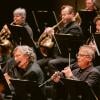
When Philharmonia Baroque Orchestra & Chorale asked conductor and harpsichordist Ruben Valenzuela for a Bach Christmas program, the ensemble knew what it would get.
The founder and artistic director of Bach Collegium San Diego, who is also one of four candidates this season for Philharmonia’s vacant music director position, turned to two of Johann Sebastian Bach’s Advent cantatas. For an unfamiliar twist, Valenzuela also added another by the composer’s 18th-century contemporary, Christoph Graupner.
The resulting concert, the first performance of which took place on Wednesday, Dec. 11, at Bing Concert Hall on the Stanford University campus, was filled with gorgeous, if sober, musical delights. The Orchestra and Chorale were in top form, and the featured soloists, tenor Nicholas Phan and soprano Jennifer Paulino, together filling in for the originally scheduled Sherezade Panthaki, were magnetic.

The Chorale, directed by Valérie Sainte-Agathe, came to the fore immediately in the exciting chorale fantasia that begins Bach’s Nun komm, der Heiden Heiland, BWV 62 (Now come, savior of the heathens). This complex fugal piece requires perfect balance among the sections, exact timing, and clear diction. The Orchestra was no less on its mettle in the ritornellos, recurring instrumental passages. But the real testament to the Chorale’s strength was the handful of solos taken by individual singers. Bass-baritone Joel Chapman was particularly brilliant in the relentlessly difficult aria “Streite, siege, starker Held!” (Struggle, conquer, powerful hero), which he sang with secure pitch, limpid phrasing through all the eighth-note runs, and robust tone.
Valenzuela made Graupner his personal cause in this program. The problem, as with many composers of the Baroque era, is the sheer quantity of material he produced, which creates choice paralysis.
Reiner Geist, lass doch mein Herz, GWV 1138/11 (Pure spirit, let my heart) is not for the Advent season, but it’s a beautiful work that shows more than a touch of Italian opera influence. Much less celebratory than the surrounding Bach cantatas, the piece in this performance owed much to Phan, who was a phenomenal soloist. His legato was unshakeable, even in the face of a string of German consonants, like the line “Ach, zieh mich aus dem Weltgetümmel” (Oh, take me out of the worldly turmoil). If that won’t break you, then a tsunami wouldn’t either.

Even more recommendable is Graupner’s Overture in F Major, GWV 445. Like Georg Philipp Telemann’s overture-suites, this one ranges all over the map and is filled with great tunes and lively dance movements. It’s definitely a find, and Valenzuela conducted it with fine attention to detail.
Graupner’s suite includes a polonaise, an infectious hornpipe, and a minuet in Lombard rhythm (an accented 16th note followed by a dotted eighth note). But the jewel is the slow movement, titled “Le desire.” A lovely violin melody, here unfolded by concertmaster Elizabeth Blumenstock with absolutely natural, unforced feeling and phrasing over a minimal, plucked accompaniment, it will stick in my head for a while.
The concert’s last work, Herz und Mund und Tat und Leben, BWV 147a (Heart and mouth and deed and life), was performed in the lesser-known Weimar Advent version and again featured Chorale members. Mezzo-soprano Mindy Ella Chu struck gold with a luminous rendition of “Schäme dich, O seele nicht” (Do not be ashamed, oh soul). Paulino sang her one number brilliantly.

The only problem with BWV 147a is that it doesn’t include that famous “anthem of the wedding industry,” as Valenzuela called it in his remarks from the stage, “Jesu, joy of man’s desiring.” But he conducted the chorale anyway in order to send us out smiling — which the music certainly did.
This story was first published in Datebook in partnership with the San Francisco Chronicle.




